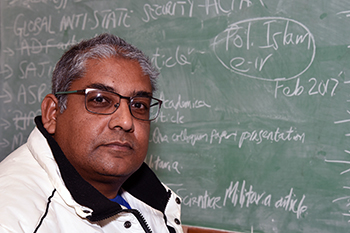Latest News Archive
Please select Category, Year, and then Month to display items
12 January 2024
|
Story Nonsindiswe Qwabe
|
Photo Sonia Small
 Since joining the UFS in 2008, Dr Grey Magaiza has worked extensively on approaches that can foster the socio-economic transformation of societies.
Since joining the UFS in 2008, Dr Grey Magaiza has worked extensively on approaches that can foster the socio-economic transformation of societies.
“The future should be one where communities can decide on their development agenda and futures. That’s the most important for me.” Dr Grey Magaiza, Deputy Director of the Centre for Gender and Africa Studies (CGAS) and Head of the Community Development programme on the Qwaqwa Campus, is passionate about capacitating communities to be agents of change and advancement. His vision for the future emphasises the empowerment of communities to take charge of their development by actively participating in decision making and the implementation of development projects that can improve their lives.
Since joining the UFS in 2008, Dr Magaiza has worked extensively on approaches that can foster the socio-economic transformation of societies. Over the years, he has crafted his research speciality into one that he is most proud of – being an interdisciplinary scientist immersed in the development of communities.
“I’m in a fortunate position of researching what I like. I say ‘fortunate’, because I’ve taken the time to understand what I’m passionate about, which is the overall field of rural livelihoods and livelihood futures – in short, community development. My research starts from an engaged university, understanding the elements that a university must use to enhance transformation and relevance to its immediate community in terms of development.”
One of the ways he has done this is by looking at social entrepreneurship as a development approach for young people in a rural setting. Through workshops with non-profit and civic organisations in Qwaqwa, Dr Magaiza has been helping these organisations to map out their needs and actively meet them through the involvement and support of external role players.
“We understand that communities are part of the national development agenda, but even that national agenda respects community knowledge and intentions and allows communities to shape their identity. A critical enabler of this is community organising. You bring back the capacity in communities to have dialogues on issues affecting them as spaces for engagement, knowledge exchange, and for people to just talk about their way forward.”
By enabling communities to define their development agenda, they can address their specific needs, challenges, and aspirations, he said. “When I look at livelihood futures, it’s quite an exciting aspect of my work – it’s like looking into a fortune tellers’ globe, because you’re not deciding for communities what they should do, but the communities themselves take those decisions.”
International success for UFS Professor in Japan
2016-12-07

Prof Hussein Solomon from the UFS was recently
appointed as Visiting Professor at Osaka University
in Japan.
Photo: Charl Devenish
He has been involved with the Osaka University for several years, but Prof Hussein Solomon’s recent appointment as Visiting Professor will allow the University of the Free State (UFS) and Osaka to work on long-term issues.
Kovsie academics hold their own internationally
His appointment at the university in Japan came as no surprise as he is a regular teacher to students and leader of seminars to staff. According to Prof Solomon, Senior Professor at the Department of Political Studies and Governance at the UFS, Kovsie academics can hold their own internationally.
The Faculty of Humanities has a memorandum of understanding with Osaka School of International Public Policy (OSIPP), which consists of Political Science, Public Administration, Law and Economics at Osaka University.
Enhancing the universities’ relationship
“I have been involved with Osaka since 2007, initially with their Global Collaboration Center (GLOCOL), focusing on conflict resolution, and then later with OSIPP.”
Although Prof Solomon has been working with Osaka for a while, his appointment will enhance the relationship between the universities.
“We have been cooperating with Osaka for some time, hosting annual conferences, engaging in staff and student exchanges, as well as the establishment of the international centre. This appointment allows us to work on longer-term issues allowing us to chase funding together and deepen our existing linkages,” he says.
UFS doctoral students being jointly supervised
Prof Solomon says that he would like to see the doctoral students from the UFS being jointly supervised. “We already have one of our doctorial students, Alta Vermeulen, who is being co-supervised between myself and Prof Virgil Hawkins from Osaka,” he says.
Prof Solomon was also recently appointed to the board of flagship journal, United Nations Economic Commission for Africa (UNECA).